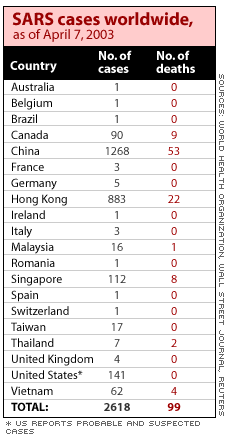NEW YORK (CNN/Money) - There's no question SARS is scary, and there's no question it's bad news for many Asian economies and probably the global economy, too. But when it comes to the U.S. economy, the impact is less clear.
For the time being, at least, the world's largest economy seems to have little to fear.

SARS, or severe acute respiratory syndrome, is a pneumonia-like disease with no known cure or origin. It has infected more than 2,600 people, killing 100, in 20 countries in Asia, Europe and North America.
Health officials suspect it originated in southern China and spread quickly to Hong Kong, and the World Health Organization (WHO) has taken the unusual measure of discouraging travel to those regions.
Hong Kong, which depends on tourism for about 5 percent of its total economy, felt the weight of SARS almost immediately, with conferences and exhibitions canceled, and restaurants, bars and shopping malls turned to near ghost towns.
Hong Kong has one of the Pacific Rim's biggest economies, and the region has been one of the few bright spots of a sickly global economy. SARS has led many analysts to cut their growth outlook for the area, and Morgan Stanley's chief global economist, Stephen Roach, has said SARS could contribute to a global recession.
"Unfortunately, the SARS effect is concentrated on Asia -- long the fastest-growing region in the world and the one area that essentially had been keeping the global economy afloat," Roach wrote in a research note Friday. "To the extent that this source of global resilience is now being undermined by disease-related panic, an already bruised and battered global economy has little left to lean on."
U.S. could use help, but...
Many economists believe the U.S. economy would be better off if the rest of the world were doing better. If people around the world are willing and able to spend money, then they're more willing to invest in the United States and buy U.S. exports.
On the other hand, few economists are worried that the global slowdown will have much of an effect on the U.S. economy, aside from any damage it might do to the already suffering airlines.
| Related stories
|

|
|
|
|
"The United States has been the engine of global growth for some time," said Joshua Feinman, chief economist at Deutsche Bank. "It would behoove the world if other engines were to develop, but it doesn't look like that's happening. As long as that's the case, U.S. growth will mostly be determined by what happens here."
As for the risk of SARS spreading here, the Centers for Disease Control and Prevention says it has seen no evidence yet of "community transmission" of the disease in the United States.
Though there are more than 100 suspected cases of SARS in the United States, no one has died yet, and many analysts are hoping the CDC's quick response to the disease will keep it from becoming a major problem.
"The SARS virus may not have much of a direct impact on U.S. growth -- though we would look for some spillover to the consumer confidence data," said David Rosenberg, chief U.S. economist at Merrill Lynch.
But with so much still unknown about the disease, analysts have little more to go on than hope -- nobody yet knows for sure how the story will unfold.
On Monday, a WHO official said it seemed SARS's spread was slowing. Then Singapore, which seemed to have gotten the disease under control, reported six new cases and two new deaths.
"We can only watch this develop daily and change the outlook frequently," said David Kotok, chief investment officer at Cumberland Advisors in Vineland, N.J. "SARS is a terrible killer. It raises the risk of a failed recovery. It is not easily vaccinated by the Fed, nor fiscal stimulus, nor tax cuts. We hope it is short-lived and doesn't become a big issue."

|

